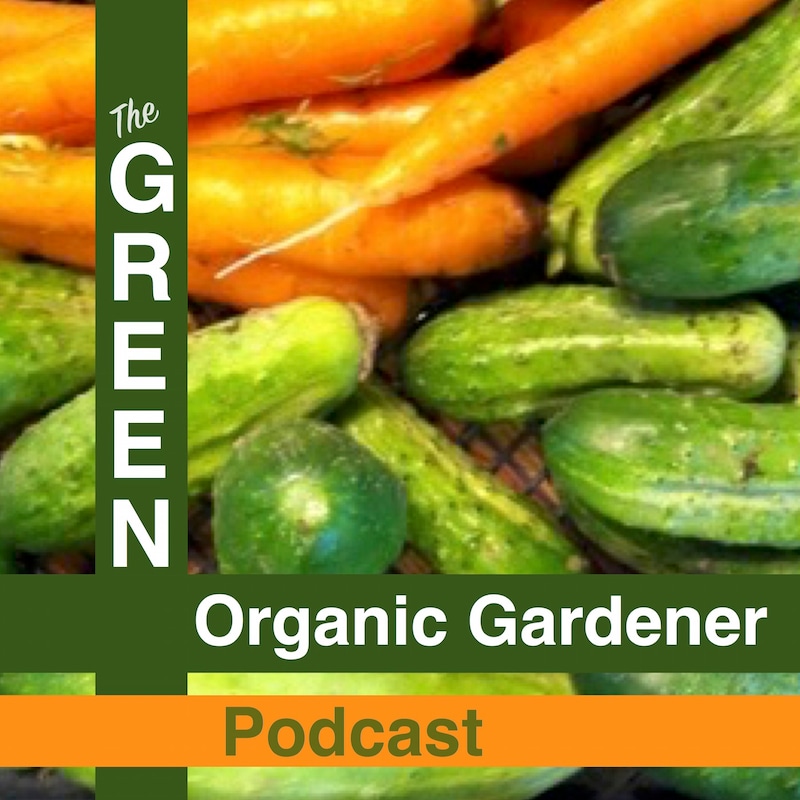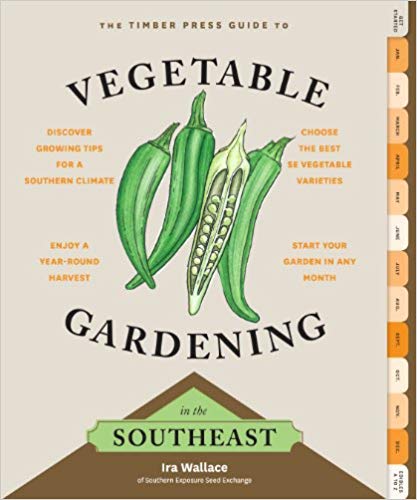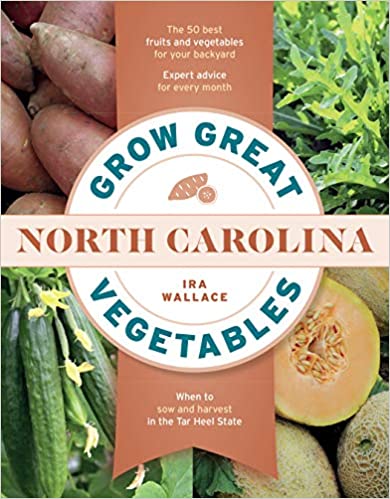
Shownotes
Ira Wallace serves on the board of the Organic Seed Alliance and is a worker/owner of the cooperatively managed Southern Exposure Seed Exchange, which offers over 700 varieties of open-pollinated heirloom and organic seeds selected for flavor and regional adaptability. She is also an organizer of the Heritage Harvest Festival at Monticello, a fun, family-friendly event featuring an old-time seed swap, local food, hands-on workshops, demos, and more. She currently writes about heirloom vegetable varieties for magazines and blogs including Mother Earth News, Fine Gardening, and Southern Exposure.
Tell us a little about yourself.
At this trying time, the number of people who started buying seeds this last week, people with children
we homeschooled
to have a homeschool moment everyday
so much math and science
good nutrition and taste for your amid
Mineral, VA
east coast earthquake
epicenter between Charlottes Ville and
Southern Exposure Seed Exchange,
mid atlantic and southeast
people who have ea. yanking for
With climate change people are growing different things, I've heard of people growing okra here in Montana.
Tell me about your first gardening experience?
well, It looks like our internet is a little unstable so that might be a problem but we'll try to keep going
started gardening with my grandmother about 71 years ago
in Tampa Fl
we had a double lot in one of the lots in the town was our big garden
pecan tree
hot in the summer
summer garden was partially shaded
- okra
- southern peas
however we had a 3 season garden in terms of the fall, winter spring
turned around from the way that I am used to now
my grandmother who raised me gardening
passed away when I went off with college
motivated me with my student friends to start a garden, it was a pitiful over by the art studios but we thought it was the best garden ever!
at The New College in Sarasota Florida
private college at that time, since it has become the honors college of UFLA system
yeah
so I was lucky that I had been admitted and had a scholarship
when my grandmother passed
How did you learn how to garden organically?
I learned the basics from my grandmother
David Bradshaw
I learned the sensible things from family and back it up from science in college
I took taxonomy classes
I never thought anyone would make a living out of farming, my grandmother said you garden for yourself, but only rich people can make a living at farming. But we small farmers have proved that to be wrong. I was lucky enough to come up in the florida where I grew up to Carolina, I was lucky of the part of the start of the farmers market
one of the early great farmers markets in north Carolina
same time
work with little kids
before I moved into being a crafts person and professional farmer and seeds person I did a lot of volunteering in botanical gardens and local garden initiatives. Especially with kids. The thing that I did with the North Carolina Botanical Garden was plant rescue of native plants so when they destroyed by buildings volunteers would come so with the botanical gardens would try to figure out easy to propagate them and save seeds
Tell listeners about the Southern Exposure Seed Exchange
these days the Southern Exposure Seed Exchange,
it is a small seed company
We have as a mission to provide information so customers can learn about seed saving so they have more independence in seed growing!
In the early days there was a lot of the exchanging these were the people who were the early members of the Seed Savers Exchange listening things in the yearbook and exchanging things with each other.
Not really so much thinking of it as a business that was going to be viable
grow heirloom seeds who were not as hard core about it as some of us
the opportunity to read about and purchase and grow some heirlooms
seed company developed
continued providing educational opportunities
about 14 years ago
We approached Monticello 25 miles from us about doing an educational event there heritage harvest festival
which SESE cohost with
Thomas Jefferson foundation
2-4000 people come
- seed swaps
- Tours of mr Jefferson’s gardens
now highlight the role of the slave people who made Monticello gardens something to be remembered.
That's good to hear. Sometimes it's hard to explain to kids who are in third grade how our history came about. I'm glad to hear they are highlighting more the role of slave people back then.
Tell us about your book series.
Wrote my first book was
The Timber Press Guide to Vegetable Gardening in the Southeast
but gardeners wanted more specific info about their individual states.
This last year, taking some of the general knowledge that I have been sharing and honing in for state by state for five different southern states:
Grow Great Vegetables in North Carolina
- SC
- GA
- TN
You know the timing makes all the difference with success
with things at the edge of your range
I like to have, I don’t like to tell a tall tale that you can grow anything in the winter but I will talk about growing some greens and roots
I haven’t been out where you are in the west
partner is from Canada so from Florida to Ontario you can have a year round garden.
gardened all winter in ontario
year round garden
give you the specifics about
timing
varieties that will do well in that are
how to overcome some of the challenges with things
how to have more greens in the summer when it’s really hot and humid
natural shade
that kind of thing
able to work on this
and my previous book just had illustrations, this has lovely photographs so you can think about what you are going to have if you do all that work.
did I miss something
varieties that you might want to plant for a certain location.
some are good for people in Florida don't grow so good for people in Georgia where there is a longer season, so they will generally will plant two crops of early maturing varieties because it's really hot in July and August
That's so true and I know that is what my listeners are interested in is my most visited web page is most productive crops in NW Montana so your tips from the south are opposite. Mike and I were just talking that I have records since we first got married back in 1993, almost consistently it is almost always for 25 years April 7-14, for the majority of years, there are some outliers like the beginning of may or as early as March 29th but most things went in around April 7-14.
I can't hear you ... there's a bit of a delay ... I knew something peculiar was going on
One of the things with doing each of these books
looking at zone 7
in zone 7 in GA it might warm up a little bit faster then at zone 7 in Virginia and I didn’t expect that. But it’s one of the things because the you have
- coastal winds
- being further south
you get another week earlier of your production or you get stuff being able to winter over! It's lovely being able to tell people you can plant your bulbing onions in the fall and winter them over
like the bedalia onions you get in the store in GA and maybe in the Carolinas I try to grow them in Virginia and sometimes it works in VA and others not because we're a little further North
what’s likely to work in terms of the timing for planting them
I like that there’s each month what you can do and what you can do based on the zone and state that you are in!
I like to share little tips for the garden like about attracting pollinators so you have extra fun things to do each month in addition to the traditional gardening chores.
Do you have any tips for attracting pollinators?
one of the things that I like to do is have let my herbs go to flower I like having a variety of edible herbs
so things like chives, that come early in the season of the bed instead of cutting them all back planting enough so you have those early in the season is important even though I’m a seed person I really like things that self sow as well. So I tend to let things self sow
- calendula
- nigella
- poppies
that is fun
you don’t have to have a big area too because some people say my garden is so small
a little small 6 inch border along the edge and have flowers there, you mentioned having water there, the insects need water but the insects are small so a shallow bowl they know they can get water from especially during dry periods and some things they can make a little bit of nest
- twigs
- dead foliage over the winter
That allows someplace for your pollinators or beneficials to winter over
You can put it in a little orderly style so it sort of has that dog patch area
Kind of like JM Fortier makes an insect hotel?
Market Gardener Book
Market Gardener: A successful Grower’s Handbook for Small Scale Organic Farming
Yeah! I visited their farm once!
My partner's family lives in quebec, we contacted them when were visiting and got a tour! so cool
this tractor that just sits there
got us all excited about using, have you done any of that occultation
rather than digging for preparing beds, covering it with the silage tarps?
Silage Tarps
I finally just posted the other day about where Mike put his silage tarps and the lessons we learned, because I went down the other day and said do you want me to put rocks on it to hold it down and he said he can't yet because there is still too much stuff frozen that will poke through that he has to get out of there, and I also scored a billboard vinyl tarp the other day where they were taking it down and they just gave it to me.
I love
right you know
talking about preparing it in the fall
had an area that we prepared in the fall
put that tarp
when we got ready to put the other tarps down in the spring
that are
was beautiful you could just take the rake and things that were too big and branchy to leave there and rake them to the side and it was ready to plant!
compost on
probably would have been done better if we had sprinkled the compost in the fall
we want to do more!!!
I love it
who doesn’t want to reduce the amount of digging we have to do?
I love my walk behind tractor but it's great not to have to use it so much!
I'm also excited to use it down in this meadow that is full of an invasive weed- spotted knapweed and I think it will work well there, and we need to fence it in first. Those tarps are not cheap so I was so excited to score that one!
And I love chives! We do similar things with calendula and mike and Patti Armbrister talk about letting radishes and lettuce go to seed because the flowers feed the insects etc.
you know you can take brassicas that have wintered over
that went to
as well
- tat soi
- bak choy
- mixed winter greens
the flowers are really nice in salads in the spring
share some
one thing we do a lot of in the southeast is succession planting
so we have like you were mentioning Lettuce
This starts back from Thomas Jefferson who said from February through September plant a thimbleful of lettuce every Tuesday!
we don’t plant a thimbleful
we plant as much as we think we will eat that week getting into September plant every two or 3 days we want to have enough lettuce to harvest all winter so you put it close together in the seedling beds when the first frost comes we spread it out
row cover has made this job so much better!
when I was first gardening with my grandmother
frost which I wasn’t used to
did all of this mulching to try to keep
when in the 80s when spun polyester row cover and fleece came along it just made wintering over so much easier.
You probably know Lisa Ziegler she's a flower farmer in Virginia. It does and not only does it help with frost free, it keeps bugs out and moths from laying their eggs at night and then for us also in the middle of hot summer when we're putting broccolis out, sometimes we need to have them acclimate in the shade of the row cover.
Tell us about something that grew well this year.
something that grew particularly well was roselle
IDK if you can grow it where you are. it's a
Hibiscus sabdariffa
I like it because my grandmother when she was young they grew it as jam at thanksgiving was cranberry sauce
didn't have much in the way of cash
- they would make tea
- now you see it as hibiscus tea
then they would make jam
I grow it and make jam out of the swollen calixes it's so beautiful red and slightly tart!
- tea
- jam
- sauce
really fun
my friends up in Maine have grown some but they grow as a potted plant! A tall potted plant like 3 feet tall!
that goes especially good
another thing that grew really well for us last summer
Crowder Peas
we got some crowder peas from a young man who is now an intern at so far farm
one of his elderly neighbors
crowder pea a type of southern pea that grows fast and used as a cover crops traditionally fed to the animals as well ~ Crowd out the weeds crowder peas!
I love that!
black eyed peas that cook in an hour
taking a long time
cooking your own bean
the world is probably not going to fall about.
things
crowd out the weeds
leaves of these are used in stews in Africa as well as the peas as well. It's something we haven’t, even in the southeast, run out of style. It's the food that sustained southerners all the devastation of the civil war all these various types of black-eyed peas
built back up the land after the land was destroyed for growing too much cotton
Is there something you would do different next year or want to try/new?
what we are going to do us a big trial of various kinds of pole beans
like them because you don't have to lean down to harvest them
making these trellises out of cattle panels
ones we are going for are ones where the pod stays tender as the beans are forming in them so you can get both a nice protein rich bean inside and still have a nice crisp pod as well we’re gonna do about 15 of those and compare the taste
this is what they used to make leather britches out of which is to string them up and cook them in the winter as a dish that has both your fresh bean and your dried beans as a part of it.
We do struggle here growing pole beans because he say when he is about to harvest we get a frost so he grows lots of bush beans but I love that you are growing a protein and good for the soil at the saem. Someone else I just talked to said the same thing about growing in the cattle
they make your garden look so fancy
maybe I saw a picture of it, that's it!
Tell me about something that didn’t work so well this season.
oh my goodness
you know we try potatoes
we because
oh were you make little potato boxes and you add layers of mulch
it was so dry we didn’t get very good yields from them
It was unfortunate because one of my coop,remember fondly growing them in those boxes in Missouri but it didn't work so well in VA on the other hand the ones that came out were beautiful and clean and easy to harvest.
That might be a good tip, for people who live in a dryer climate and if you live in a moister climate it might make sense. Mike had a very similar experience but we're very dry here.
some summers were moist and some are dry so I don't know if we can count on the boxes but we are going to try one more section
Yeah! getting some of those nice potatoes sounds pretty enticing!
we'll you know what we did have success with with potatoes
we grew a second crop we planted in June
it was not as productive if we had gone ahead and planted them in march like we did with the boxes but those potatoes we are just finishing them up and they stored so nicely because they weren’t ready till the end of



 .
.

